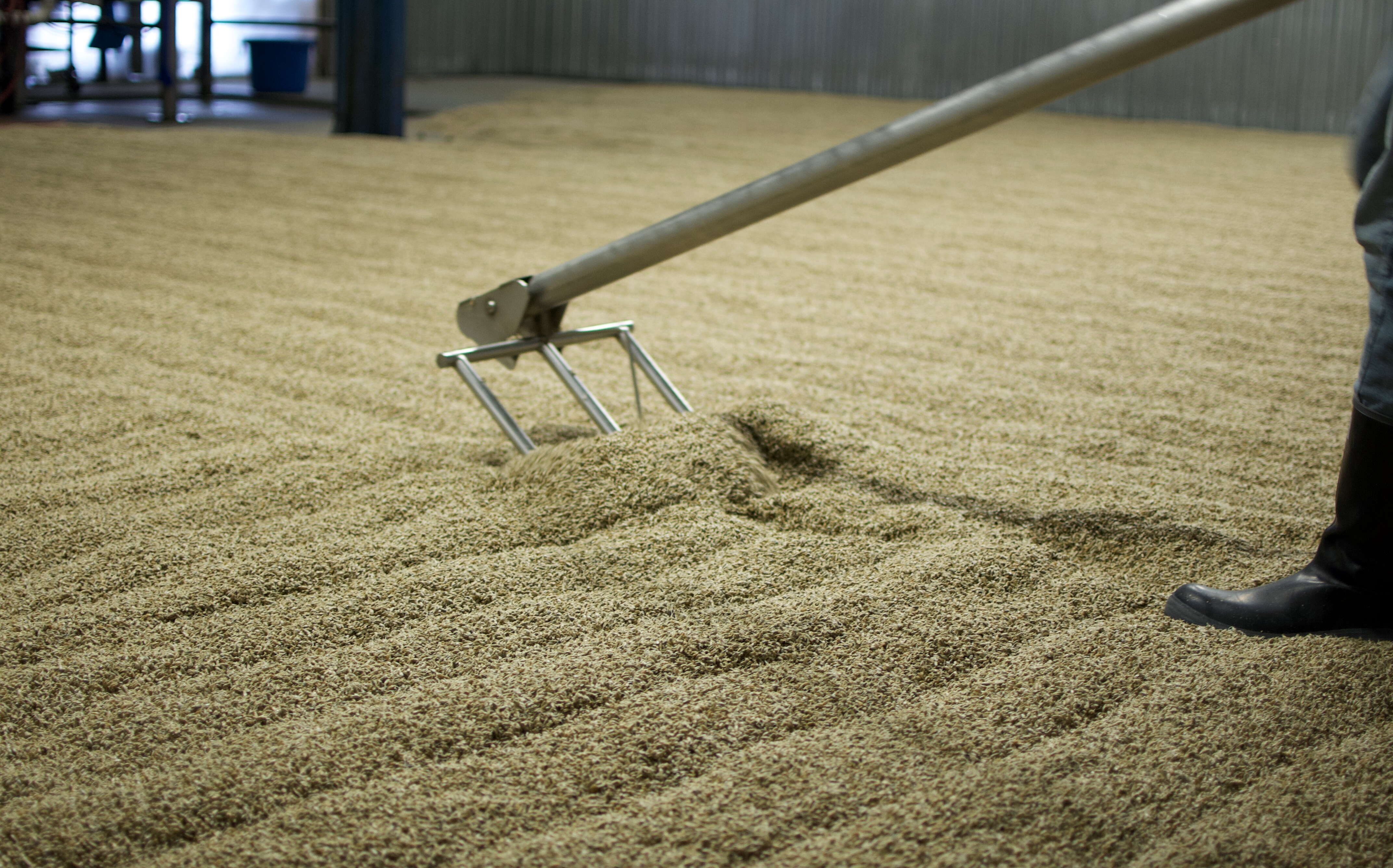
Processing Your Payment
Please do not leave this page until complete. This can take a few moments.
- News
-
Editions
View Digital Editions
Biweekly Issues
- November 17,2025
- November 03, 2025
- October 20, 2025
- October 6, 2025
- September 22, 2025
- September 8, 2025
- + More
Special Editions
- Lists
- Viewpoints
-
Our Events
Event Info
Award Honorees
- Calendar
- Biz Marketplace
Blue Ox opens bigger Lisbon Falls malthouse to make a key craft beer ingredient
 Photo / Courtesy Ben Moore
Joel Alex cuts the ribbon on his expanded facility in Lisbon Falls.
Photo / Courtesy Ben Moore
Joel Alex cuts the ribbon on his expanded facility in Lisbon Falls.
Blue Ox Malthouse last week opened an expanded facility that makes an essential ingredient of craft beer, using a centuries-old process called “floor malting.”
The 20,000-square-foot building in Lisbon Falls has quadrupled the company’s previous capacity, making Blue Ox the largest floor-malting facility outside of Europe, according to Blue Ox.
Floor malting is a traditional method for producing malt in which grain is germinated on a tiled floor — or in modern times, a concrete one — and is manually raked.
Compared with mechanized, automated systems that might be more efficient, floor malting is gentler on the grain, producing a high-quality, consistent product.
Germination
Blue Ox, founded by Joel Alex in 2013, previously occupied 7,500 square feet at 41 Capital Ave. in Lisbon Falls. In 2022, it bought the entire 20,000-square-foot industrial building, on 2.2 acres in the Lisbon Industrial Park, in order to expand.
Blue Ox is an entirely floor malting-dedicated company that has produced malted grains for the Northeast’s brewing, distilling and baking industries since its start.

The company supplies malt to roughly 120 producers.
Malt, made from grains like barley, is a key ingredient in craft beer recipes.
“Malting” is a process of soaking grain, letting it grow and then baking it down. The steps are called steeping, germination and kilning.
In the traditional floor-malting method, Blue Ox does the germination step on a floor while also applying modern methods of precise temperature and moisture controls across every aspect of production.
To date, Blue Ox has been processing about 1 million pounds of grain annually.
The expansion at full capacity is designed process about 5 million pounds of grain annually.
Grain economy
The company believes the expansion will significantly bolster the region’s grain economy — creating jobs, investing in family farms across Maine and the Northeast, and adding value to products made with Blue Ox malt.
The build-out also augments Blue Ox’s ability to create malt from a diversity of grains such as barley, wheat, rye, triticale and oats, as well as organic, smoked, custom and soon roasted products, for craft breweries and distilleries across the region and beyond.
“This expansion matters because alcohol is an agricultural product, and alcoholic production can play a huge role in robust, resilient, vibrant local food systems,” said Alex.
“In order to realize this potential, we need value-added processes that build the infrastructure that connects this alcoholic production to high quality, local ingredients and farms.”
Of more than 100 craft maltsters on the continent, Blue Ox is among a small fraction entirely dedicated to floor malting techniques, according to a news release.
Financing for the project included investment by Blue Ox and other private investors and loans from Androscoggin Bank and Walden Mutual Bank.
Equipment financing included a U.S. Small Business Administration 504 loan, which provides favorable terms for certain commercial projects, and public economic development funds including a $500,000 grant from the state’s Agricultural Infrastructure Investment Program.
“This development creates an opportunity for the growth of our grain sector, offering farmers access to new markets while also benefiting from working with grains as rotational and cover crops to enhance soil health,” said Amanda Beal, commissioner of the Maine Department of Agriculture, Conservation and Forestry.
Mainebiz web partners

The Giving Guide
The Giving Guide helps nonprofits have the opportunity to showcase and differentiate their organizations so that businesses better understand how they can contribute to a nonprofit’s mission and work.
Learn More
Work for ME
Work for ME is a workforce development tool to help Maine’s employers target Maine’s emerging workforce. Work for ME highlights each industry, its impact on Maine’s economy, the jobs available to entry-level workers, the training and education needed to get a career started.
Learn More
Groundbreaking Maine
Whether you’re a developer, financer, architect, or industry enthusiast, Groundbreaking Maine is crafted to be your go-to source for valuable insights in Maine’s real estate and construction community.
Learn more-
The Giving Guide
The Giving Guide helps nonprofits have the opportunity to showcase and differentiate their organizations so that businesses better understand how they can contribute to a nonprofit’s mission and work.
-
Work for ME
Work for ME is a workforce development tool to help Maine’s employers target Maine’s emerging workforce. Work for ME highlights each industry, its impact on Maine’s economy, the jobs available to entry-level workers, the training and education needed to get a career started.
-
Groundbreaking Maine
Whether you’re a developer, financer, architect, or industry enthusiast, Groundbreaking Maine is crafted to be your go-to source for valuable insights in Maine’s real estate and construction community.
ABOUT
NEW ENGLAND BUSINESS MEDIA SITES
No articles left
Get access now
In order to use this feature, we need some information from you. You can also login or register for a free account.
By clicking submit you are agreeing to our cookie usage and Privacy Policy
Already have an account? Login
Already have an account? Login
Want to create an account? Register
Get access now
In order to use this feature, we need some information from you. You can also login or register for a free account.
By clicking submit you are agreeing to our cookie usage and Privacy Policy
Already have an account? Login
Already have an account? Login
Want to create an account? Register







0 Comments